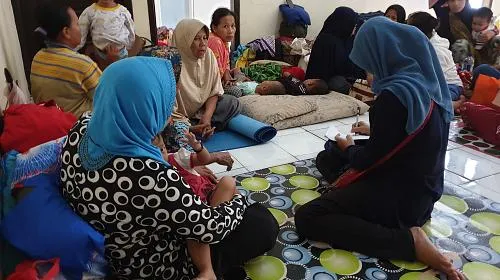JAKARTA, (December 27, 2018) – CARE has distributed 200 hygiene kits containing sarong, toothbrushes, soap, detergent, sanitary pads and buckets for people living in affected villages and displacement camps following the most recent tsunami in the Sunda Strait, Indonesia.
The numbers of affected continues to rise. Nearly 22,000 people have now been displaced as a result of the tsunami. This is largely because people are leaving coastal homes for fear of another tsunami as the Mount Krakatau volcano remains active. Most people are now living in large displacement camps, sometimes with over 600 people per camp and limited access to basic services such as sanitation and clean water.
CARE emergency experts have also carried out a rapid gender assessment to understand the specific needs of women and girls post-tsunami through consultations with women in a number of affected villages. Women and girls are often the worst affected by natural disasters, and have different and specific needs. The sanitary pads CARE is providing have also been particularly well received as there is a real shortage among women who have lost everything including basic sanitary products.
CARE has had a presence in the Serang Regency – one of the areas affected by the tsunami – since 2015. This has allowed the humanitarian organization to quickly respond after this tsunami. Since the latest warnings to stay away from the coast, CARE emergency response staff have had to take alternative routes to access affected communities. CARE is closely monitoring the very worrying ongoing activity of the Mount Krakatau volcano in case of further eruptions and devastation.
Yesterday marked 14 years since the 26 December Indian Ocean tsunami that killed 230,000 people across 14 countries. More recently, Indonesia has also faced three different natural disasters in the last six months. “We were about to commemorate three months since the Sulawesi earthquake and tsunami which killed over 2,000 people and has left tens of thousands more in need, when this latest tsunami happened. Our staff in the country have been doing all they can, some have been working continuously since the Lombok disaster in July, often far from their families, and under very difficult conditions,” says Helen Vanwel, CARE’s country director in Indonesia.
“We are very happy to hear the government of Indonesia’s commitment to build a new disaster warning system in the new year. We engage communities where we work in disaster preparedness programs, and the close succession of three natural disasters in the last six months has shown how crucial this is in saving lives and preventing damage. We have already heard that over 400 fishing boats and nearly 1,000 houses were destroyed by the tsunami. This also means hundreds of livelihoods and homes have been destroyed,” notes Vanwel. Many of the communities in those areas rely on fishing to make ends meet.
CARE has worked in Indonesia since 1967, initially focused on food distribution, small infrastructure projects, health, the environment, and water and sanitation. In 2004, CARE was one of the primary emergency responders after the South Asian tsunami that hit Indonesia. Emergency response and disaster risk reduction with a focus on women and girls is always CARE Indonesia’s first priority. Its other core activities all focus on women and youth, and include integrated risk management comprising resilience, food security and climate change, in addition to economic empowerment and leadership, and water, sanitation, and hygiene.
About CARE
Founded in 1945 with the creation of the CARE Package®, CARE is a leading humanitarian organization fighting global poverty. CARE places special focus on working alongside women and girls because, equipped with the proper resources, they have the power to lift whole families and entire communities out of poverty. That’s why women and girls are at the heart of CARE’s community-based efforts to improve education and health, create economic opportunity, respond to emergencies and confront hunger. Last year CARE worked in 93 countries and reached more than 63 million people around the world. Learn more at care.org.
Media Contact:
Mahmoud Shabeeb, +962-79-146-39-03 mshabeeb@care.org (based in Amman, Jordan)

